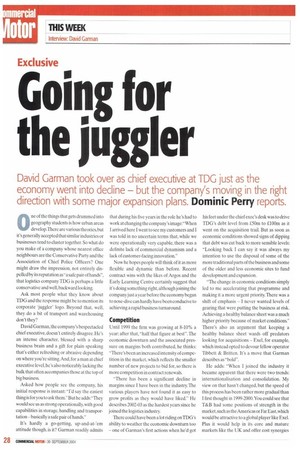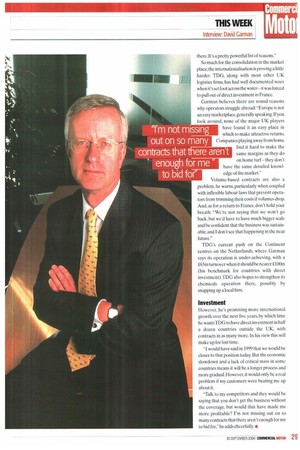the j t%fgorer
Page 28

Page 29

If you've noticed an error in this article please click here to report it so we can fix it.
David Garman took over as chief executive at TDG just as the economy went into decline — but the company's moving in the right direction with some major expansion plans. Dominic Perry reports.
0 ne of the things that gets drummed into geography students is how urban areas develop. There are various theories, but it's generally accepted that similar industries or businesses tend to cluster together. So what do you make of a company whose nearest office neighbours are the Conservative Party and the Association of Chief Police Officers? One might draw the impression, not entirely dispelled by its reputation as "a safe pair of hands", that logistics company TDG is perhaps a little conservative and well, backward looking.
Ask most people what they know about TDG and the response might be to mention its corporate 'juggler' logo. Beyond that, well, they do a bit of transport and warehousing don't they?
David Garman, the company's bespectacled chief executive, doesn't entirely disagree. He's an intense character, blessed with a sharp business brain and a gift for plain speaking that's either refreshing or abrasive depending on where you're sitting. And, for a man at chief executive level, he's also noticeably lacking the bulk that often accompanies those at the top of big business.
Asked how people see the company, his initial response is instant: "I'd say the easiest thing is for you to ask them."But he adds:"They would see us as strong operationally, with good capabilities in storage, handling and transportation — basically a safe pair of hands."
It's hardly a go-getting, up-and-at-'em attitude though, is it? Garman readily admits that during his five years in the role he's had to work at changing the company's irnage:"When I arrived here I went to see my customers and I was told in no uncertain terms that, while we were operationally very capable, there was a definite lack of commercial dynamism and a lack of customer-facing innovation."
Now he hopes people will think of it as more flexible and dynamic than before. Recent contract wins with the likes of Argos and the Early Learning Centre certainly suggest that it's doing something right, although joining the company j ust a year before the economy began to nose-dive can hardly have been conducive to achieving a rapid business turnaround.
Competition
Until 1999 the firm was growing at 8-10% a year; after that, "half that figure at best". The economic downturn and the associated pressure on margins both contributed, he thinks: -There's been an increased intensity of competition in the market, which reflects the smaller number of new projects to bid for, so there is more competition in contract renewals.
"There has been a significant decline in margins since I have been in the industry. The various players have not found it as easy to grow profits as they would have liked." He describes 2002-03 as the hardest years since he joined the logistics industry.
There could have been a lot riding on TDG's ability to weather the economic downturn too — one of Garman's first actions when he'd got his feet under the chief exec's desk was to drive TDG's debt level from 150m to L100m as it went on the acquisition trail. But as soon as economic conditions showed signs of dipping that debt was cut back to more sensible levels: "Looking back I can say it was always my intention to use the disposal of some of the more traditional parts of the business and some of the older and less economic sites to fund development and expansion.
"The change in economic conditions simply led to me accelerating that programme and making it a more urgent priority. There was a shift of emphasis — I never wanted levels of gearing that were putting the business at risk. Achieving a healthy balance sheet was a much higher priority because of market conditions." There's also an argument that keeping a healthy balance sheet wards off predators looking for acquisitions — Exel, for example, which instead opted to devour fellow operator Tibbett & Britten. It's a move that Garman describes as "bold".
He adds: "When I joined the industry it became apparent that there were two trends: internationalisation and consolidation. My view on that hasn't changed, but the speed of this process has been rather more gradual than I first thought in 1999-2000. You could see that T&B had some positions of strength in the market, such as the Americas or Far East,which would be attractive to a global player like Exel. Plus it would help in its core and mature markets like the UK and offer cost synergies there. It's a pretty powerful list of reasons."
So much for the consolidation in the market place; the internationalisation is proving a little harder. TDG, along with most other UK logistics firms, has had well documented woes when it's set foot across the water—it was forced to pull out of direct investment in France.
Garman believes there are sound reasons why operators struggle abroad: "Europe is not an easy marketplace, generally speaking. If you look around, none of the major UK players have found it an easy place in which to make attractive returns. Companies playing away from home find it hard to make the same margins as they do on home turf— they don't have the same detailed knowledge of the market."
Volume-based contracts are also a problem, he warns, particularly when coupled with inflexible labour laws that prevent operators from trimming their costs if volumes drop. And, as for a return to France, don't hold your breath: "We're not saying that we won't go back, but we'd have to have much bigger scale and he confident that the business was sustainable, and I don't see that happening in the near future."
TDG's current push on the Continent centres on the Netherlands, where Garman says its operation is under-achieving, with a £65m turnover when it should be nearer flOOrn (his benchmark for countries with direct investment). TDG also hopes to strengthen its chemicals operation there, possibly by snapping up a local firm.
Investment
However, he's promising more international growth over the next five years, by which time he wants TDG to have direct investment in half a dozen countries outside the UK, with contracts in as many more. In his view this will make up for lost time.
"I would have said in 1999 that we would be closer to that position today. But the economic slowdown and a lack of critical mass in some countries means it will be a longer process and more gradual. However, it would only be a real problem if my customers were beating me up about it.
"Talk to my competitors and they would be saying that you don't get the business without the coverage, but would that have made me more profitable? I'm not missing out on so many contracts that there aren't enough for me to bid for," he adds cheerfully.


































































































































































































